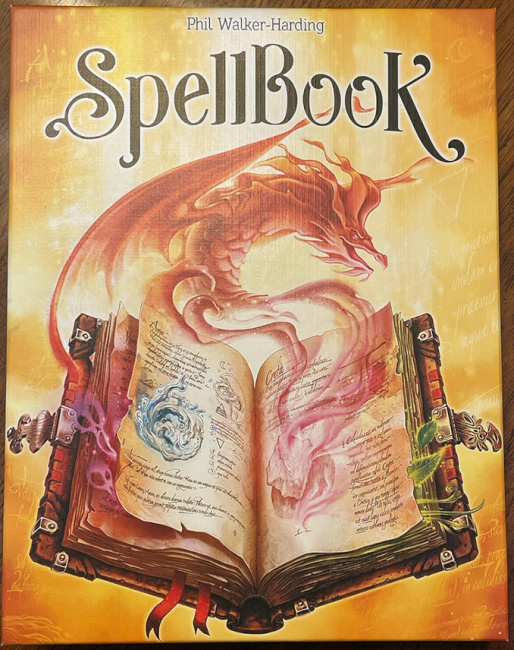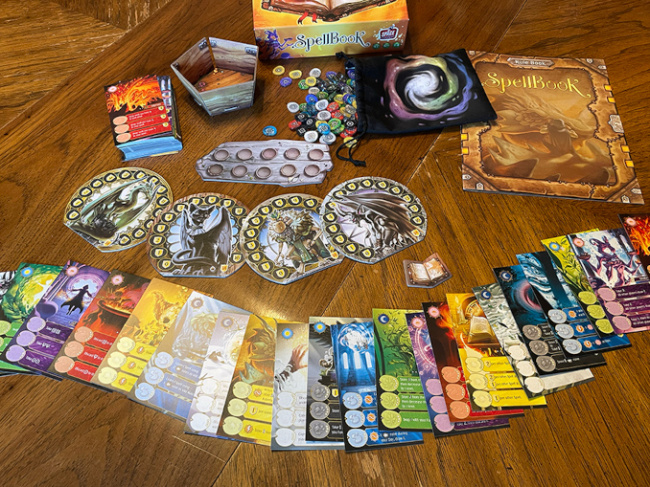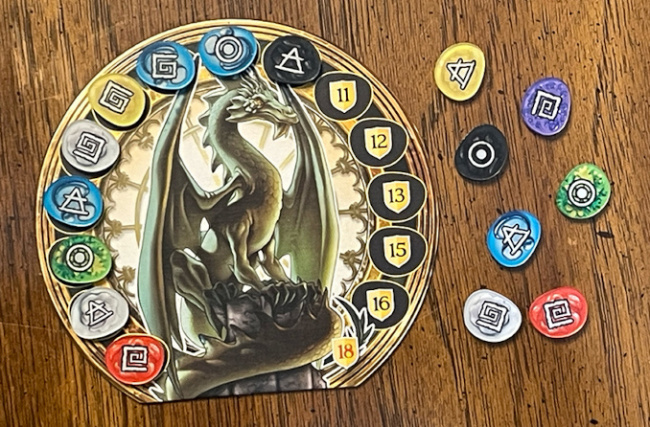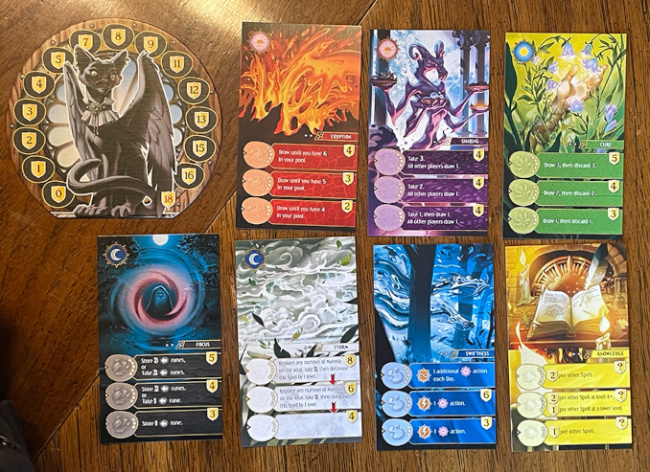Spellbook
Publisher: Space Cowboys
Release Date: September, 2023
MSRP: $44.99
Number of Players: 1 to 4
Product #: SCSPEL01EN
Age Rating: 12 and up
ICv2 Rating: 4 Stars out of 5
Who hasn’t dreamed of being a powerful wizard, casting spells to bend reality to their every whim? Spellbook gives players their chance, challenging them to outwit their rivals in a contest of spell-casting. But is the result enchanting? Or does this spell fizzle?
Summary: The objective in Spellbook, like many games, is to have the most points at the end of the game. Points can be earned by learning new spells for your spellbook (hence the name) and by “storing” magical Materia on your Familiar board (I like to think of it as “feeding your Familiar”). The game ends when any player has learned all seven of their spells or completely fills up their Familiar board.
The method used to achieve both goals is through collecting and spending “Materia”—Lucite tokens depicting magical runes in seven colors to match the seven spells—in the proper combinations. Each turn, a player gets to take three actions: a “morning” action that typically gains them Materia, a “midday” action that might manipulate their pool of Materia or store Materia on their Familiar board, and an “evening” action that normally involves learning a new spell. When a player learns a spell, they either gain a one-use or permanent advantage, or they gain an ability to “cast” the spell as one of their turn actions for an enhanced effect for the rest of the game.
Originality: Spellbook is, somehow, both familiar and fresh at the same time. There is something comfortably similar to other games I have played over the years, but it is put together in an interesting way that does not feel stale or derivative thanks to the interactions between the various spells and abilities. The game offers a number of strategic options that, based on our playtests, seem equally viable, leading to very close final scores. One can focus on building up their Familiar, or learning a lot of low-level spells quickly, or concentrating on learning a few higher-powered spells that offer more potent benefits. Or even other approaches or combinations that we haven’t imagined yet, depending on which spells are included in that game.
Presentation: The box is brightly colored and eye-catching, with dynamic cover art and easy-to-read text. The components are shown off to good effect, alongside a brief description of the gameplay that is enticing despite its brevity. The artistry continues inside the box, with high-quality artwork throughout, including distinctive art on every spell card, a nifty little cardboard bucket to hold discarded Materia, a lovely cloth bag to draw them from randomly, and charming little characters on the Familiar boards. The graphic layout and icons on the components are intuitive and communicate important information clearly.
Quality: I particularly like the Materia tokens, which use a thin material printed on both sides sandwiched between two layers of plastic. They look great, feel good in the hand, and should be resilient enough to stand up to repeated play. I found the rulebook to be well done, with clear writing that had no glaring omissions or errors and plenty of illustrations and examples, as well as an exhaustive appendix that explains the effects of every spell card in the game.
But, I would feel remiss if I did not point out a couple of items that disappointed me to some extent. The cardboard insert in the box is not particularly useful for storing the components between games. I would have preferred that the cardboard “bucket” had been designed in a way that it could be assembled without resorting to a clear sticker to hold it together. And I worry that the cards may suffer damage as they have square corners instead of rounded ones. I would also have preferred the cards to be a bit thicker, and the text on the cards could have been a tad larger for those of us with aging eyes.
Marketability: Designer Phil Walker-Harding has a proven track record with successful titles including Sushi Go! and Barenpark, and Space Cowboys has established a strong reputation through their high-quality and popular designs. The price point is very reasonable considering the amount and quality of the components in the game. The gameplay fits solidly into the lighter end of the “Eurogame” genre, and promises to be accessible to a broad audience, with features to appeal to both casual and competitive players.
Overall: I very much enjoyed playing Spellbook. I found that it scratches the same strategy game itch as popular titles like Splendor or Azul, while still offering interesting challenges and distinctive elements that make it stand apart from them. There is an undeniable thrill when you pull tokens out of the bag, hoping for the right combination to appear, but players who want to reduce the risk of a random draw have a lot of ways to take control of their destiny thanks to their spells, giving the game a solid balance between tactical play and randomness and not feeling chaotic or uncontrollable. The gameplay starts out very relaxed, almost zen-like through the early turns, but rapidly accelerates as the game reaches its climax, presenting a satisfying “storyline” to the game. I also appreciate that the designer has included 21 different spells, but uses only seven of them in each game, creating a lot of replayability and variation to help keep the game fresh and interesting, and forcing players to tailor their strategy to the spells available to them.
And that’s why I’m giving this game 4 out of 5.
– William Niebling
Source: ICV2








